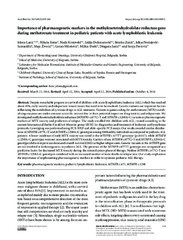| dc.creator | Lazić, Jelena | |
| dc.creator | Kotur, Nikola | |
| dc.creator | Krstovski, Nada | |
| dc.creator | Dokmanović, Lidija | |
| dc.creator | Zukić, Branka | |
| dc.creator | Predojević-Samardzić, Jelica | |
| dc.creator | Zivotić, Maja | |
| dc.creator | Milosević, Goran | |
| dc.creator | Dorić, Milica | |
| dc.creator | Janić, Dragana | |
| dc.creator | Pavlović, Sonja | |
| dc.date.accessioned | 2022-11-15T14:53:53Z | |
| dc.date.available | 2022-11-15T14:53:53Z | |
| dc.date.issued | 2017 | |
| dc.identifier.issn | 0354-4664 | |
| dc.identifier.uri | https://imagine.imgge.bg.ac.rs/handle/123456789/1080 | |
| dc.description.abstract | Despite remarkable progress in survival of children with acute lymphoblastic leukemia (ALL) which has reached about 85%, early toxicity and relapse rate remain issues that need to to be resolved. Genetic variants are important factors influencing the metabolism of cytotoxic drugs in ALL treatment. Variants in genes coding for methotrexate (MTX)-metabolizing enzymes are under constant scientific interest due to their potential impact on drug toxicity and relapse rate. We investigated methylenetetrahydrofolate reductase (MTHFR) c.677C gt T and MTHFR c.1298A gt C variants as pharmacogenetic markers of MTX toxicity and predictors of relapse. The study enrolled 161 children with ALL, treated according to the current International Berlin-Frankfurt-Munster group (BFM) for diagnostics and treatment of leukemia and lymphoma protocols. Genotyping was performed using PCR-RFLP and allele-specific PCR assays. Our results revealed similar distributions of MTHFR c.677C gt T and MTHFR c.1298A gt C genotypes among 104 healthy individuals as compared to pediatric ALL patients. A lower incidence of early MTX toxicity was noted in the MTHFR c.677TT genotype (p=0.017), while MTHFR c.1298A gt C genotypes were not associated with MTX toxicity. Carriers of any MTHFR c.677C gt T and MTHFR c.1298A gt C genotypes did not experience decreased overall survival (OAS) or higher relapse rates. Genetic variants in the MTHFR gene are not involved in leukemogenesis in pediatric ALL. The presence of the MTHFR c.677TT genotype was recognized as a predictive factor for decreased MTX toxicity during the intensification phase of therapy. Neither MTHFR c.677C gt T nor MTHFR c.1298A gt C genotypes correlated with an increased number of toxic deaths or relapse rate. Our study emphasizes the importance of implementing pharmacogenetic markers in order to optimize pediatric ALL therapy. | en |
| dc.publisher | Srpsko biološko društvo, Beograd, i dr. | |
| dc.relation | info:eu-repo/grantAgreement/MESTD/Integrated and Interdisciplinary Research (IIR or III)/41004/RS// | |
| dc.rights | openAccess | |
| dc.rights.uri | https://creativecommons.org/licenses/by-nc-nd/4.0/ | |
| dc.source | Archives of Biological Sciences | |
| dc.subject | pharmacogenetic markers | en |
| dc.subject | pediatric lymphoblastic leukemia | en |
| dc.subject | MTHFR c.677 | en |
| dc.subject | MTHFR c.1298 | en |
| dc.title | Importance of pharmacogenetic markers in the methylenetetrahydrofolate reductase gene during methotrexate treatment in pediatric patients with acute lymphoblastic leukemia | en |
| dc.type | article | |
| dc.rights.license | BY-NC-ND | |
| dc.citation.epage | 246 | |
| dc.citation.issue | 2 | |
| dc.citation.other | 69(2): 239-246 | |
| dc.citation.rank | M23 | |
| dc.citation.spage | 239 | |
| dc.citation.volume | 69 | |
| dc.identifier.doi | 10.2298/ABS160325091L | |
| dc.identifier.fulltext | https://imagine.imgge.bg.ac.rs/bitstream/id/70037/Importance_of_pharmacogenetic_markers_in_the_methylenetetrahydrofolate_reductase_gene_2017.pdf | |
| dc.identifier.scopus | 2-s2.0-85019656420 | |
| dc.identifier.wos | 000402556600005 | |
| dc.type.version | publishedVersion | |

